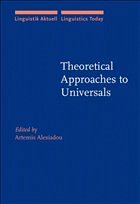Nicht lieferbar

Theoretical Approaches to Universals
Versandkostenfrei!
Nicht lieferbar
Main description:The present volume has its origin in the GLOW conference on Universals hosted in Berlin in March 1999. The papers in this volume are concerned both with formal as well as with substantive universals. All the contributions attempt to identify universal properties of the language faculty, as well as the source of cross-linguistic variation. They cover a wide range of empirical phenomena across languages such as locality, deletion, verb classes, XP-split constructions, Quantifier Raising, the EPP, the Person Case Constraint etc. Some of the articles pay particular attention to th...
Main description:
The present volume has its origin in the GLOW conference on Universals hosted in Berlin in March 1999. The papers in this volume are concerned both with formal as well as with substantive universals. All the contributions attempt to identify universal properties of the language faculty, as well as the source of cross-linguistic variation. They cover a wide range of empirical phenomena across languages such as locality, deletion, verb classes, XP-split constructions, Quantifier Raising, the EPP, the Person Case Constraint etc. Some of the articles pay particular attention to the organization of the grammar, the type of operations that are effective, the role of features in determining variation, and primitive notions of phrase-structure (c-command, Agree etc.). Others show how structural differences capture semantic and morphological differences within a language and across languages, and how these are the ultimate source of linguistic variation. The book is of primary interest to researchers and students in syntactic theory, comparative syntax, and linguistic variation.
Table of contents:
- List of contributors
- Introduction
- Universal features and language-particular morphemes
- Agree or attract?
- Distributed deletion
- Roots, constituents, and c-command
- A four-way classification of monadic verbs
- On agreement
- A minimalist account of conflation processes
- Morphological constraints on syntactic derivations
- Intermediate traces, reconstruction and locality effects
- Index
The present volume has its origin in the GLOW conference on Universals hosted in Berlin in March 1999. The papers in this volume are concerned both with formal as well as with substantive universals. All the contributions attempt to identify universal properties of the language faculty, as well as the source of cross-linguistic variation. They cover a wide range of empirical phenomena across languages such as locality, deletion, verb classes, XP-split constructions, Quantifier Raising, the EPP, the Person Case Constraint etc. Some of the articles pay particular attention to the organization of the grammar, the type of operations that are effective, the role of features in determining variation, and primitive notions of phrase-structure (c-command, Agree etc.). Others show how structural differences capture semantic and morphological differences within a language and across languages, and how these are the ultimate source of linguistic variation. The book is of primary interest to researchers and students in syntactic theory, comparative syntax, and linguistic variation.
Table of contents:
- List of contributors
- Introduction
- Universal features and language-particular morphemes
- Agree or attract?
- Distributed deletion
- Roots, constituents, and c-command
- A four-way classification of monadic verbs
- On agreement
- A minimalist account of conflation processes
- Morphological constraints on syntactic derivations
- Intermediate traces, reconstruction and locality effects
- Index




